
 |
|
|
#31 |
|
Member
Join Date: Dec 2004
Posts: 1,247
|
Hi Tim,
Sorry I'm not responding faster, but work takes precedence and I don't currently have a good library nearby to get the images from. Basically, I know a few things about Oceanic weapons. I also know that it's fairly difficult to get good pictures of those weapons on line, and now that I'm not near a world-class university library, I don't have the access to the old ethnographic reports that I used to have. That said... Basically, the club's fairly primitively made, in the sense that it's asymmetric (lumpy). If it is an old Oceanic piece, especially one made for war, I would expect a much higher standard of worksmanship. As you undoubtedly know, artistry was an important an integral part of making a good weapon. That's my main problem with the idea that this is an old ethnographic club. It's not artistic, and in fact, a teenager could have easily made it. Personally, I'm perfectly willing to believe that the wrapping is bark. It could easily be fig bark (from Australia), or linden bark (from Europe), or hickory bark (from the US), or any of a number of other possibilities. There are a number of trees that produce bark tough enough to make cordage from, and unfortunately, they are not confined to one climatic zone or one continent. There's a lab in Madison, Wisconsin that could easily identify the wood and perhaps the bark, and there are geology labs in many universities that could probably ID the rock to location. However, each of these tests is somewhat destructive and probably costly. Whether it is worth it in this case I can't tell, but it is technically possible to determine where the materials came from. Hope this helps, F |
|
|

|
|
|
#32 |
|
Member
Join Date: Dec 2004
Location: What is still UK
Posts: 5,951
|
Hello fearn,
I do not think I shall pursue it quite as far as a Bio Lab. I shall go to the museum to investigate Biro-Biro forms, bird head formed clubs, flint nodule heads. Here is the rub, I see a great deal of artistry. Did I qualify as an artist? I would like to think I did so would my customers. Come up and see my etchings. A powerful objet trouve. The halft has been thoughtfully selected and the construction, contrary to just a glance at the pictures, is very sensitive so as to make the whole thing feel good and move with ease. In real space the thing has a powerful presence. It is even possible that hitting people was not the main function. I do not think the people in question had primitive art concepts either. I might just be going completely DADA. I can upload pictures of many images of clubs and adzes of basically the same construction sadly not one just the same as this one. They were indeed most likely made by relatively young people. Would showing pictures here be considered publishing? Last edited by Tim Simmons; 24th March 2007 at 07:09 PM. Reason: spelling spellign |
|
|

|
|
|
#33 |
|
Member
Join Date: Dec 2004
Location: What is still UK
Posts: 5,951
|
The power of the objet trouve is with us all the time. This is from today's Guardian a British national newspaper. This image is deep within the western worlds Psyche.
So I really do not see any problem with a flint stone looking like a birds head or skull, or fitting a cultural image in the least. Especially when dealing with an animistic society where the forms are of known and recorded significance. Just look at the first Biro-Biro stones at the start of the thread. 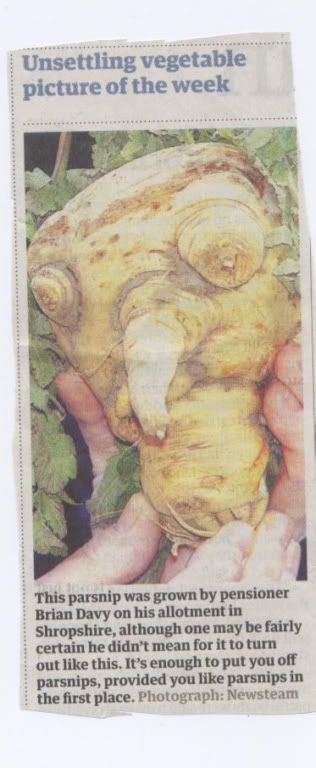
Last edited by Tim Simmons; 24th March 2007 at 11:06 PM. |
|
|

|
|
|
#34 |
|
Member
Join Date: Dec 2004
Posts: 1,247
|
I have to agree about found art, Tim--and thanks for the parsnip pic.
|
|
|

|
|
|
#35 |
|
Member
Join Date: Mar 2007
Posts: 407
|
I grew up in England playing with flint and occasionally trying to make something with it. The stone looks exactly like English flint. It could well be from somewhere else, but the color and shape seem very familiar to me.
Josh |
|
|

|
|
|
#36 |
|
Member
Join Date: Dec 2004
Location: What is still UK
Posts: 5,951
|
Yes I kept looking at flint while walking the dogs. I guess flint is flint. Flint was as mentioned earlier a trade commodity. All a can say to everyone is wait untill i get back from the museum. in the meantime I shall upload pictures of other this in the same line, some are made of slate and again I think slate is slate
 . .
|
|
|

|
|
|
#37 |
|
Member
Join Date: Dec 2004
Location: What is still UK
Posts: 5,951
|
I want this one. I think this is made of two types of wood like some African throwing clubs. The halft is very similar but not of the same construction, but I have more.
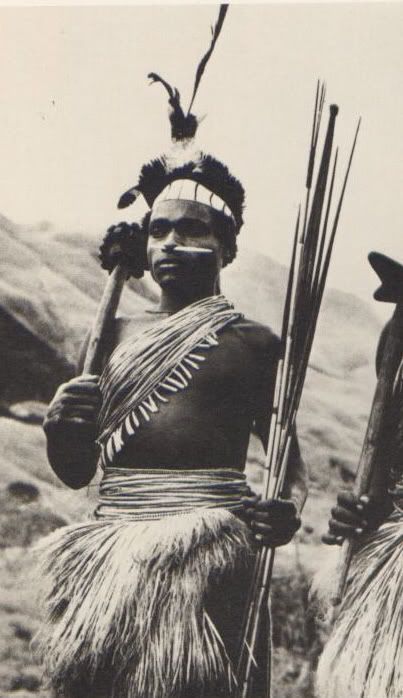 These charming ladies have slate dress clubs. I have more. 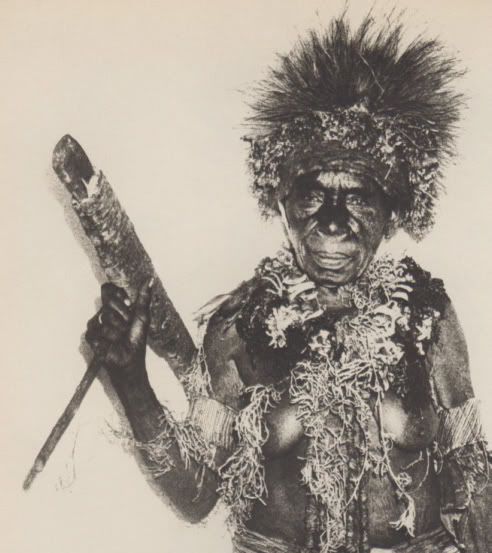 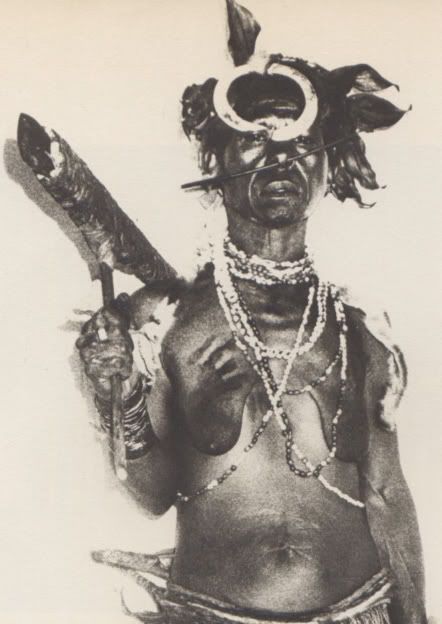 More to come. I could go on uploading picture untill tomorrow so there really is not much point. I was completely unaware that flint was only found in England  . .
Last edited by Tim Simmons; 26th March 2007 at 08:50 PM. |
|
|

|
|
|
#38 |
|
Member
Join Date: Dec 2004
Posts: 1,247
|
Hi Tim,
Neat pics, but I think you may be mistaken about the materials in the first one: I'd guess it's a stone-headed club, not wood-headed: Pic from the web The axes are from the Jimi Valley, and Sir David Attenborough of all people, describes them being made at a place called Menjim in the 1950's. The book is called Journeys to the Past, first published in 1959. Flint is just a form of cryptocrystalline silicon, aka chert. It's pretty common in England, France, and Belgium, but cryptocrystalline quartz is found all over the world. Check out the Wikipedia article for some more info, although it's incomplete. |
|
|

|
|
|
#39 |
|
Member
Join Date: Dec 2004
Posts: 58
|
Tim, Fearn, All three clubs are Stone heads. Rod
|
|
|

|
|
|
#40 |
|
Member
Join Date: Dec 2004
Posts: 1,247
|
You're right, Inveterate, although the bottom two are technically axes with wooden counterweights (the back blade) covered with woven rattan. Those stone axes are mostly abandoned to ceremonial use, now that steel axes are available.
F |
|
|

|
|
|
#41 |
|
Member
Join Date: Dec 2004
Posts: 58
|
Fearn, Yes most commonly from the Mt Hagen area. Tim , have now had the opportunity to go through 2 extensive libraries on Oceanic and Aboriginal Artifacts and can find nothing like your club, Am wondering could it be European or African? Cheers Rod
|
|
|

|
|
|
#42 |
|
Member
Join Date: Dec 2004
Location: What is still UK
Posts: 5,951
|
I will try to get into town this April. I do not think it is anything other than Melanesian or Micronesian. Look at sago pounders and adze from these regions. Maybe we only need to wait a week or so, all depends on how much work I have to do.
|
|
|

|
|
|
#43 |
|
Member
Join Date: Dec 2004
Location: What is still UK
Posts: 5,951
|
I am on a mission to find all pictures of similar consruction. This is a tool and nowhere near as carefully made as the flint club.
http://www.tribalworldbooks.com.au/mlPage5.html |
|
|

|
|
|
#44 |
|
Member
Join Date: Dec 2004
Location: What is still UK
Posts: 5,951
|
Explore here, great pictures. Plate 75, my club is of the same quality if not a little better than these.
http://images.google.com/imgres?imgu...%3Den%26sa%3DN |
|
|

|
|
|
#45 |
|
Member
Join Date: Dec 2004
Location: What is still UK
Posts: 5,951
|
So why not use flint stone. We know it was traded and would be as good as turtle bone.
http://images.google.com/imgres?imgu...%3Den%26sa%3DN |
|
|

|
|
|
#46 |
|
Member
Join Date: Dec 2004
Posts: 1,247
|
Hi Tim,
Why not use flint stone? This is where the geology lesson comes in. Islands come in three basic flavors (so long as a geologist is not reading this :-)): 1) continental, 2) volcanic and oceanic, and 3) coral. Basically, flint will only occur on continental islands. Micronesia is composed exclusively of volcanic high islands and coral atolls. On coral atolls, the stone is (you guessed it) coral. This is why atoll dwellers use things like Tridacna shell for tools and put shark teeth on their clubs. On volcanic islands, the only stones available are volcanic, things like basalt and obsidian. Flint only occurs on continental rocks (ditto with chert). There are no continental islands in Micronesia, and in Polynesia, only New Zealand is continental (and Fiji, if you're going to count Fiji as a Melanesia/Polynesia intermediate). Melanesia contains islands of all three types, and thus it is the only possible source for a flint rock. Even then the rock would have had to come from some place on or near New Guinea, the larger Solomon Islands, or New Caledonia. It could also have come from Australia, of course. This assumes, of course, that the club actually came from the islands. Bottom line: identifying the rock is pretty important, because it will help define a source. Hope this helps. F |
|
|

|
|
|
#47 |
|
Member
Join Date: Dec 2004
Location: What is still UK
Posts: 5,951
|
You are absolutely right. I was working on the methods of construction that appear woefully inadequate and primitive to us. I have not got the funds to do forensic research. How extensive was the trade in flint? I hope to get an answer at the Anthropological Research Centre at th BM.
|
|
|

|
|
|
#48 |
|
Member
Join Date: Dec 2004
Posts: 1,247
|
I'll be interested in the answer. I know of local trade in stones, and it would be interesting if there were long distance trading as well.
Have fun! F |
|
|

|
|
|
#49 |
|
Member
Join Date: Dec 2004
Location: What is still UK
Posts: 5,951
|
I am not sure if this link will work. I will post an extract about how in some parts traditional trade patterns continued into the very early 1900s. It is interesting to read that there was some conflict with pearl shell workers that had been established on some island of the Torres Straits from 1860.
http://www.qm.qld.gov.au/organisatio...3_1_barham.pdf |
|
|

|
|
|
#50 |
|
Member
Join Date: Dec 2004
Location: What is still UK
Posts: 5,951
|
Read page 53 of the last link.
 wrong page wrong page 
Last edited by Tim Simmons; 30th March 2007 at 09:10 PM. |
|
|

|
|
|
#51 |
|
Member
Join Date: Dec 2004
Location: What is still UK
Posts: 5,951
|
Sorry i meant page54
 
|
|
|

|
|
|
#52 |
|
Member
Join Date: Dec 2004
Location: What is still UK
Posts: 5,951
|
I have not been able to get to town but I have not forgotten this thread and will purse it further. I have been looking at the islands that make up Vanuatu as well PNG , New Britain, New Ireland. All of these places could be supplied with Cape York goods or certainly flint from NE AUS. The trouble is this is fairly new ground. Go to an posh auction house punkahwallah and they only know what they last sold that looked similar where ever it was from. Probably confidently labeled PNG.

|
|
|

|
|
|
#53 |
|
(deceased)
Join Date: Dec 2004
Location: OKLAHOMA, USA
Posts: 3,138
|
OCEANIC CLUBS TEND TO BE WOOD MOST OF THE TIME BUT THERE ARE SOME STONE HEADED EXAMPLES. THE ONLY SOURCE OF OBSIDIAN WHICH I HAVE SEEN WAS FOUND IN THE ADMIRALTY ISLANDS I FORGET WHICH ISLAND BUT IT WAS SOUGHT AFTER THRUOUT THE REGION. MOST STONE CLUB HEADS I HAVE SEEN HAVE BEEN VOLCANIC STONE OR METAMORPHIC/SEDIMENTARY , I HAVE SEEN SOME QUARTZITE USED IN AUSTRALIA AS WELL ,USUALLY FOR KNIVES AND ADZ HEADS. THE FAVORED VOLCANIC STONE IS BASALT WHICH IS HEAVIER THAN THE LAVA THAT HAS BEEN EXPOSED TO THE AIR AND FLUFFED UP WITH BUBBLES. SERPENTINE IS ALSO USED WHICH IS FROM WHAT I UNDERSTAND IS METAMORPHIC AND CAN EVENTUALLY TURN INTO JADE WHICH IS ALSO SOUGHT AFTER. THE MOUNT HAGEN CEREMONIAL AXES SEEM TO HAVE HEADS MADE OF SOME FORM OF SHALE OR HARD SOAPSTONE, SOME OF WHICH IS QUITE BEAUTIFUL BUT CHIPS EASILY OT THE EDGE. GRANITE IS ALSO USED WHERE IT CAN BE FOUND BUT I HAVEN'T PERSONALLY SEEN A GRANITE CLUB ON AN OCEANIC WEAPON.
THE AMERICAS HAVE A AMPLE SUPPLY OF FLINT SO IT IS A COMMON MATERIAL USED FOR POINTS AND KNIVES BUT OTHER HEAVIER STONES WERE USUALLY USED FOR WAR CLUBS. EUROPE AND EGYPT HAVE LOTS OF FLINT BUT THAT IS AS FAR AS MY KNOWLEGE GOES AS TO WHERE FLINT IS USED. |
|
|

|
|
|
#54 |
|
(deceased)
Join Date: Dec 2004
Location: OKLAHOMA, USA
Posts: 3,138
|
I WILL TRY AND PUT IN A FEW PICTURES FOR GRINS.
 I AM SURPRIZED ALL 4 CAME THRU. #1 DOUBLE HEADED OBSIDIAN SPEAR ADMIRALTY IS. I AM SURPRIZED ALL 4 CAME THRU. #1 DOUBLE HEADED OBSIDIAN SPEAR ADMIRALTY IS.#2 SOLOMON ISLANDS, RENNEL IS. STONE HEADED CLUB, BASALT #3 AZMAT CLUB VOLCANIC STONE #4 OLD PAPUA STONE CLUB HEAD, VOLCANIC STONE. |
|
|

|
|
|
#55 |
|
(deceased)
Join Date: Dec 2004
Location: OKLAHOMA, USA
Posts: 3,138
|
I AM FEELING LUCKY I WILL TRY A FEW MORE
 #1 PNG. VOLCANIC STONE AX SHOWN MOUNTED #2 OLD KUKU WOODEN CLUB SIMILUAR TO SOME OF THE STONE FORMS FROM NEW GUINEA #3 PNG STONE ADZ SOFT STONE HEAD PROBABLY CEREMONIAL OR RECENT AND NOT FOR USE. #4 RECENT CEREMONIAL AX PNG. PRETTY GREEN STONE AX BLADE LOOKS LIKE JADE BUT CAN BE SCRATCHED WITH A KNIFE. SOAPSTONE? I DON'T HAVE ANY PICTURES OF THE AUSTRALIAN QUARTZITE MATERIAL SO WILL HAVE TO LOOK FARTHER. THIS IS NOT MUCH HELP IDENTIFING THE FLINT NODULE BUT PERHAPS IT POINTS THE WAY FROM OCEANIC TO A CONTINENTAL ORIGIN UNLESS THERE IS FLINT USED IN AUSTRALIA OR NEW GUINEA OR NEW ZEALAND WHICH I HAVE NOT PERSONALLY SEEN. I SUPPOSE YOU COULD CONTACT THE ARTEFACT OR ROCK HUNTING CLUBS IN THOSE COUNTRYS TO FIND OUT FOR SURE. GOOD LUCK Last edited by VANDOO; 4th May 2007 at 12:44 AM. |
|
|

|
|
|
#56 |
|
Member
Join Date: Dec 2004
Location: What is still UK
Posts: 5,951
|
Interesting stuff.
Page 1 "the quarried flint nodules from the cave were taken elsewhere and made into tools" We also know from Haddons observations that flint was indeed a trade item. http://www.dpi.nsw.gov.au/__data/ass...aborigines.pdf This one is good too, with pics.  http://nma.gov.au/shared/libraries/a...stories_bw.pdf |
|
|

|
|
|
#57 |
|
Member
Join Date: Dec 2004
Location: What is still UK
Posts: 5,951
|
Short of the okay from the British Museum official wallah, in spite of much indisputable supportive evidence there seems to be a severe case of "not in the book syndrome" as if a complete catalogue is ever possible in the first place, we know all forms there in the book stupid.

|
|
|

|
|
|
#58 |
|
Member
Join Date: Dec 2004
Location: What is still UK
Posts: 5,951
|
I finally managed to get into town today. Before I go any further on the club I will just tell you that I also visited the Wallace collection. This was rather humbling, but take heart we on this forum from what I have seen are all in possession of at least one piece worthy of the most prestigious collection. keep a look out on their web site as the oriental arms are to be published some time October onwards.
Okay the visit to the Anthropological centre at the BM was a little disappointing. I could find stacks of related information more than I could copy but nothing exactly the same. Also there is no expert on call as there used to be when a worked at my "Alter Mater" the museum of mankind. beside I did not take the object with me. I could pursue it even further by visiting the store which would still be free but I really do not have the time to commit. Anyway lets look at what i could find. There are some splendid old German books from the very early 1900s in the centre with fantastic pictures. This picture is interesting as it has, that old chestnut the saw fish bill. Which is handy  . .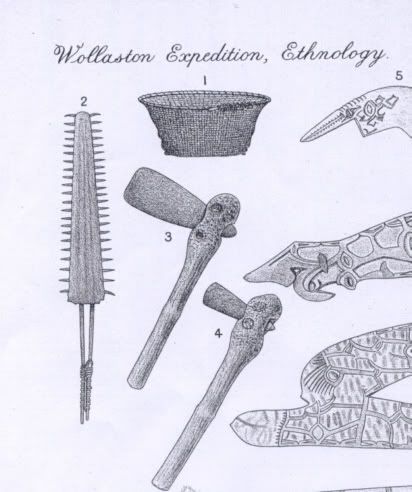 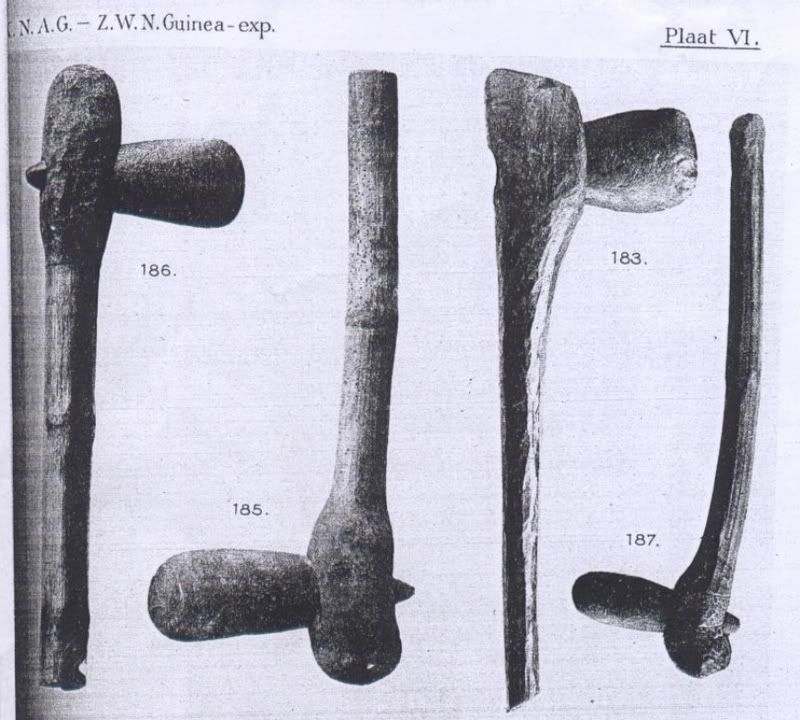 There were references to a great many cult/magic totem stone and bird head objects, as i mention earlier the club in question could be a staff or ceremonial. I was able to bet a good photo copy of this shell axe which is much less fine than the club. What is note worthy is the use of barked wood and wood stripped of bark as in my piece. 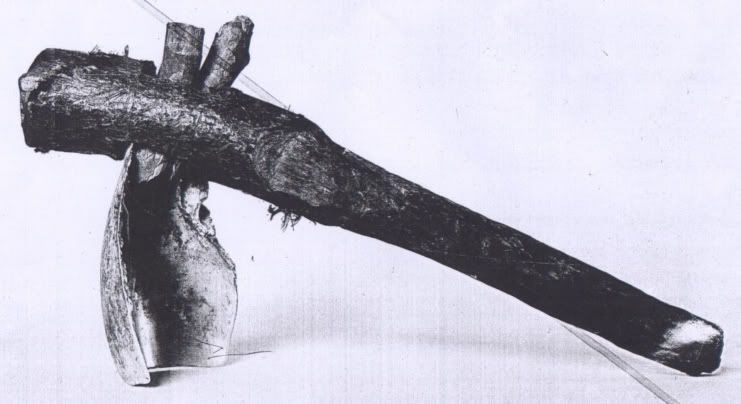 Finally I thought this is quite an interesting picture. Judging by the size of this chaps tool I would say he was nearly as big as me  . .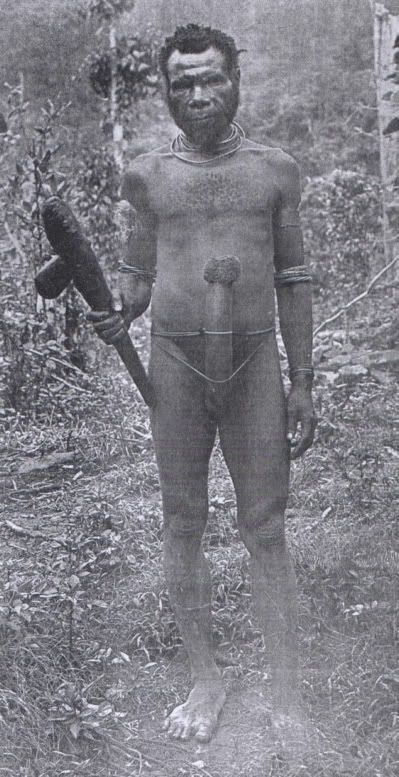
Last edited by Tim Simmons; 9th August 2007 at 08:35 PM. |
|
|

|
|
|
#59 |
|
Member
Join Date: Dec 2004
Location: What is still UK
Posts: 5,951
|
Last edited by Tim Simmons; 9th August 2007 at 09:42 PM. Reason: slurred speach |
|
|

|
|
|
#60 |
|
Member
Join Date: Dec 2004
Location: What is still UK
Posts: 5,951
|
I just had to add this pic of the Cerne Abbas giant. Well I have to blow my own trumpet.
|
|
|

|
 |
| Thread Tools | Search this Thread |
| Display Modes | |
|
|